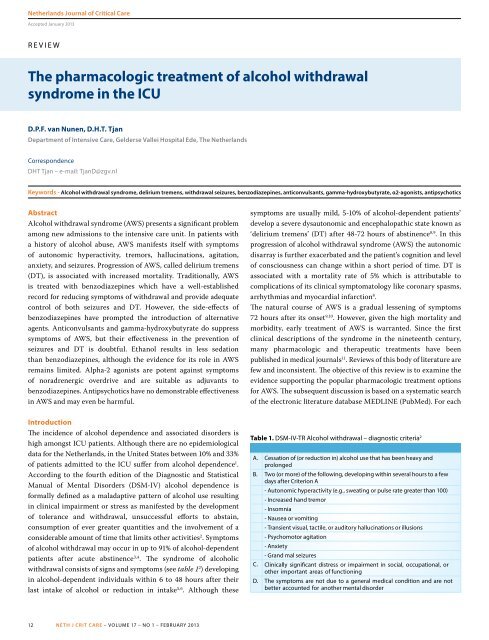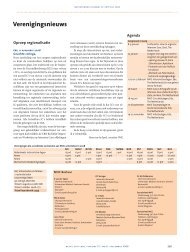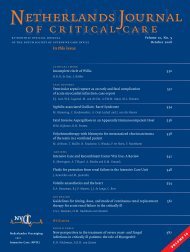Netherlands Journal of Critical Care
Netherlands Journal of Critical Care - NJCC
Netherlands Journal of Critical Care - NJCC
Create successful ePaper yourself
Turn your PDF publications into a flip-book with our unique Google optimized e-Paper software.
<strong>Netherlands</strong> <strong>Journal</strong> <strong>of</strong> <strong>Critical</strong> <strong>Care</strong><br />
Accepted January 2013<br />
review<br />
The pharmacologic treatment <strong>of</strong> alcohol withdrawal<br />
syndrome in the ICU<br />
D.P.F. van Nunen, D.H.T. Tjan<br />
Department <strong>of</strong> Intensive <strong>Care</strong>, Gelderse Vallei Hospital Ede, The <strong>Netherlands</strong><br />
Correspondence<br />
DHT Tjan – e-mail: TjanD@zgv.nl<br />
Keywords - Alcohol withdrawal syndrome, delirium tremens, withdrawal seizures, benzodiazepines, anticonvulsants, gamma-hydroxybutyrate, α2-agonists, antipsychotics<br />
Abstract<br />
Alcohol withdrawal syndrome (AWS) presents a significant problem<br />
among new admissions to the intensive care unit. In patients with<br />
a history <strong>of</strong> alcohol abuse, AWS manifests itself with symptoms<br />
<strong>of</strong> autonomic hyperactivity, tremors, hallucinations, agitation,<br />
anxiety, and seizures. Progression <strong>of</strong> AWS, called delirium tremens<br />
(DT), is associated with increased mortality. Traditionally, AWS<br />
is treated with benzodiazepines which have a well-established<br />
record for reducing symptoms <strong>of</strong> withdrawal and provide adequate<br />
control <strong>of</strong> both seizures and DT. However, the side-effects <strong>of</strong><br />
benzodiazepines have prompted the introduction <strong>of</strong> alternative<br />
agents. Anticonvulsants and gamma-hydroxybutyrate do suppress<br />
symptoms <strong>of</strong> AWS, but their effectiveness in the prevention <strong>of</strong><br />
seizures and DT is doubtful. Ethanol results in less sedation<br />
than benzodiazepines, although the evidence for its role in AWS<br />
remains limited. Alpha-2 agonists are potent against symptoms<br />
<strong>of</strong> noradrenergic overdrive and are suitable as adjuvants to<br />
benzodiazepines. Antipsychotics have no demonstrable effectiveness<br />
in AWS and may even be harmful.<br />
symptoms are usually mild, 5-10% <strong>of</strong> alcohol-dependent patients 7<br />
develop a severe dysautonomic and encephalopathic state known as<br />
‘delirium tremens’ (DT) after 48-72 hours <strong>of</strong> abstinence 8,9 . In this<br />
progression <strong>of</strong> alcohol withdrawal syndrome (AWS) the autonomic<br />
disarray is further exacerbated and the patient’s cognition and level<br />
<strong>of</strong> consciousness can change within a short period <strong>of</strong> time. DT is<br />
associated with a mortality rate <strong>of</strong> 5% which is attributable to<br />
complications <strong>of</strong> its clinical symptomatology like coronary spasms,<br />
arrhythmias and myocardial infarction 8 .<br />
The natural course <strong>of</strong> AWS is a gradual lessening <strong>of</strong> symptoms<br />
72 hours after its onset 9,10 . However, given the high mortality and<br />
morbidity, early treatment <strong>of</strong> AWS is warranted. Since the first<br />
clinical descriptions <strong>of</strong> the syndrome in the nineteenth century,<br />
many pharmacologic and therapeutic treatments have been<br />
published in medical journals 11 . Reviews <strong>of</strong> this body <strong>of</strong> literature are<br />
few and inconsistent. The objective <strong>of</strong> this review is to examine the<br />
evidence supporting the popular pharmacologic treatment options<br />
for AWS. The subsequent discussion is based on a systematic search<br />
<strong>of</strong> the electronic literature database MEDLINE (PubMed). For each<br />
Introduction<br />
The incidence <strong>of</strong> alcohol dependence and associated disorders is<br />
high amongst ICU patients. Although there are no epidemiological<br />
data for the <strong>Netherlands</strong>, in the United States between 10% and 33%<br />
<strong>of</strong> patients admitted to the ICU suffer from alcohol dependence 1 .<br />
According to the fourth edition <strong>of</strong> the Diagnostic and Statistical<br />
Manual <strong>of</strong> Mental Disorders (DSM-IV) alcohol dependence is<br />
formally defined as a maladaptive pattern <strong>of</strong> alcohol use resulting<br />
in clinical impairment or stress as manifested by the development<br />
<strong>of</strong> tolerance and withdrawal, unsuccessful efforts to abstain,<br />
consumption <strong>of</strong> ever greater quantities and the involvement <strong>of</strong> a<br />
considerable amount <strong>of</strong> time that limits other activities 2 . Symptoms<br />
<strong>of</strong> alcohol withdrawal may occur in up to 91% <strong>of</strong> alcohol-dependent<br />
patients after acute abstinence 3,4 . The syndrome <strong>of</strong> alcoholic<br />
withdrawal consists <strong>of</strong> signs and symptoms (see table 1 2 ) developing<br />
in alcohol-dependent individuals within 6 to 48 hours after their<br />
last intake <strong>of</strong> alcohol or reduction in intake 5,6 . Although these<br />
Table 1. DSM-IV-TR Alcohol withdrawal – diagnostic criteria 2<br />
A. Cessation <strong>of</strong> (or reduction in) alcohol use that has been heavy and<br />
prolonged<br />
B. Two (or more) <strong>of</strong> the following, developing within several hours to a few<br />
days after Criterion A<br />
- Autonomic hyperactivity (e.g., sweating or pulse rate greater than 100)<br />
- Increased hand tremor<br />
- Insomnia<br />
- Nausea or vomiting<br />
- Transient visual, tactile, or auditory hallucinations or illusions<br />
- Psychomotor agitation<br />
- Anxiety<br />
- Grand mal seizures<br />
C. Clinically significant distress or impairment in social, occupational, or<br />
other important areas <strong>of</strong> functioning<br />
D. The symptoms are not due to a general medical condition and are not<br />
better accounted for another mental disorder<br />
12 Neth j crit care – volume 17 – no 1 – february 2013







